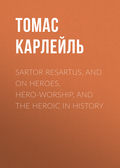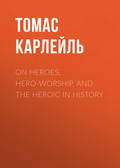
Томас Карлейль
Sacred Books of the East
CHAPTER II
ON EARNESTNESS
Earnestness is the path of immortality (Nirvâna), thoughtlessness the path of death. Those who are in earnest do not die, those who are thoughtless are as if dead already.
Having understood this clearly, those who are advanced in earnestness delight in earnestness, and rejoice in the knowledge of the elect.
These wise people, meditative, steady, always possessed of strong powers, attain to Nirvâna, the highest happiness.
If an earnest person has roused himself, if he is not forgetful, if his deeds are pure, if he acts with consideration, if he restrains himself, and lives according to law—then his glory will increase.
By rousing himself, by earnestness, by restraint and control, the wise man may make for himself an island which no flood can overwhelm.
Fools follow after vanity. The wise man keeps earnestness as his best jewel.
Follow not after vanity, nor after the enjoyment of love and lust! He who is earnest and meditative, obtains ample joy.
When the learned man drives away vanity by earnestness, he, the wise, climbing the terraced heights of wisdom, looks down upon the fools: free from sorrow he looks upon the sorrowing crowd, as one that stands on a mountain looks down upon them that stand upon the plain.
Earnest among the thoughtless, awake among the sleepers, the wise man advances like a racer, leaving behind the hack.
By earnestness did Maghavan (Indra) rise to the lordship of the gods. People praise earnestness; thoughtlessness is always blamed.
A Bhikshu (mendicant) who delights in earnestness, who looks with fear on thoughtlessness, moves about like fire, burning all his fetters, small or large.
A Bhikshu (mendicant) who delights in reflection, who looks with fear on thoughtlessness, cannot fall away from his perfect state—he is close upon Nirvâna.
CHAPTER III
THOUGHT
As a fletcher makes straight his arrow, a wise man makes straight his trembling and unsteady thought, which is difficult to guard, difficult to hold back.
As a fish taken from his watery home and thrown on the dry ground, our thought trembles all over in order to escape the dominion of Mâra, the tempter.
It is good to tame the mind, which is difficult to hold in and flighty, rushing wherever it listeth; a tamed mind brings happiness.
Let the wise man guard his thoughts, for they are difficult to perceive, very artful, and they rush wherever they list: thoughts well guarded bring happiness.
Those who bridle their mind which travels far, moves about alone, is without a body, and hides in the chamber of the heart, will be free from the bonds of Mâra, the tempter.
If a man's faith is unsteady, if he does not know the true law, if his peace of mind is troubled, his knowledge will never be perfect.
If a man's thoughts are not dissipated, if his mind is not perplexed, if he has ceased to think of good or evil, then there is no fear for him while he is watchful.
Knowing that this body is fragile like a jar, and making his thought firm like a fortress, one should attack Mâra, the tempter, with the weapon of knowledge, one should watch him when conquered, and should never rest.
Before long, alas! this body will lie on the earth, despised, without understanding, like a useless log.
Whatever a hater may do to a hater, or an enemy to an enemy, a wrongly-directed mind will do him greater mischief.
Not a mother, not a father, will do so much, nor any other relatives; a well-directed mind will do us greater service.
CHAPTER IV
FLOWERS
Who shall overcome this earth, and the world of Yama, the lord of the departed, and the world of the gods? Who shall find out the plainly shown path of virtue, as a clever man finds the right flower?
The disciple will overcome the earth, and the world of Yama, and the world of the gods. The disciple will find out the plainly shown path of virtue, as a clever man finds the right flower.
He who knows that this body is like froth, and has learnt that it is as unsubstantial as a mirage, will break the flower-pointed arrow of Mâra, and never see the king of death.
Death carries off a man who is gathering flowers, and whose mind is distracted, as a flood carries off a sleeping village.
Death subdues a man who is gathering flowers, and whose mind is distracted, before he is satiated in his pleasures.
As the bee collects nectar and departs without injuring the flower, or its color or scent, so let a sage dwell in his village.
Not the perversities of others, not their sins of commission or omission, but his own misdeeds and negligences should a sage take notice of.
Like a beautiful flower, full of color, but without scent, are the fine but fruitless words of him who does not act accordingly.
But, like a beautiful flower, full of color and full of scent, are the fine and fruitful words of him who acts accordingly.
As many kinds of wreaths can be made from a heap of flowers, so many good things may be achieved by a mortal when once he is born.
The scent of flowers does not travel against the wind, nor that of sandal-wood, or of Tagara and Mallikâ flowers; but the odor of good people travels even against the wind; a good man pervades every place.
Sandal-wood or Tagara, a lotus-flower, or a Vassikî, among these sorts of perfumes, the perfume of virtue is unsurpassed.
Mean is the scent that comes from Tagara and sandal-wood; the perfume of those who possess virtue rises up to the gods as the highest.
Of the people who possess these virtues, who live without thoughtlessness, and who are emancipated through true knowledge, Mâra, the tempter, never finds the way.
As on a heap of rubbish cast upon the highway the lily will grow full of sweet perfume and delight, thus among those who are mere rubbish the disciple of the truly enlightened Buddha shines forth by his knowledge above the blinded worldling.
CHAPTER V
THE FOOL
Long is the night to him who is awake; long is a mile to him who is tired; long is life to the foolish who do not know the true law.
If a traveller does not meet with one who is his better, or his equal, let him firmly keep to his solitary journey; there is no companionship with a fool.
"These sons belong to me, and this wealth belongs to me," with such thoughts a fool is tormented. He himself does not belong to himself; how much less sons and wealth?
The fool who knows his foolishness, is wise at least so far. But a fool who thinks himself wise, he is called a fool indeed.
If a fool be associated with a wise man even all his life, he will perceive the truth as little as a spoon perceives the taste of soup.
If an intelligent man be associated for one minute only with a wise man, he will soon perceive the truth, as the tongue perceives the taste of soup.
Fools of poor understanding have themselves for their greatest enemies, for they do evil deeds which bear bitter fruits.
That deed is not well done of which a man must repent, and the reward of which he receives crying and with a tearful face.
No, that deed is well done of which a man does not repent, and the reward of which he receives gladly and cheerfully.
As long as the evil deed done does not bear fruit, the fool thinks it is like honey; but when it ripens, then the fool suffers grief.
Let a fool month after month eat his food (like an ascetic) with the tip of a blade of Ku['s]a-grass, yet is he not worth the sixteenth particle of those who have well weighed the law.
An evil deed, like newly-drawn milk, does not turn suddenly; smouldering, like fire covered by ashes, it follows the fool.
And when the evil deed, after it has become known, turns to sorrow for the fool, then it destroys his bright lot, nay, it cleaves his head.
Let the fool wish for a false reputation, for precedence among the Bhikshus, for lordship in the convents, for worship among other people!
"May both the layman and he who has left the world think that this is done by me; may they be subject to me in everything which is to be done or is not to be done," thus is the mind of the fool, and his desire and pride increase.
"One is the road that leads to wealth, another the road that leads to Nirvâna"—if the Bhikshu, the disciple of Buddha, has learnt this, he will not yearn for honor, he will strive after separation from the world.
CHAPTER VI
THE WISE MAN
If you see a man who shows you what is to be avoided, who administers reproofs, and is intelligent, follow that wise man as you would one who tells of hidden treasures; it will be better, not worse, for him who follows him.
Let him admonish, let him teach, let him forbid what is improper!—he will be beloved of the good, by the bad he will be hated.
Do not have evil-doers for friends, do not have low people for friends: have virtuous people for friends, have for friends the best of men.
He who drinks in the law lives happily with a serene mind: the sage rejoices always in the law, as preached by the elect.
Well-makers lead the water wherever they like; fletchers bend the arrow; carpenters bend a log of wood; wise people fashion themselves.
As a solid rock is not shaken by the wind, wise people falter not amidst blame and praise.
Wise people, after they have listened to the laws, become serene, like a deep, smooth, and still lake.
Good men indeed walk warily under all circumstances; good men speak not out of a desire for sensual gratification; whether touched by happiness or sorrow wise people never appear elated or depressed.
If, whether for his own sake, or for the sake of others, a man wishes neither for a son, nor for wealth, nor for lordship, and if he does not wish for his own success by unfair means, then he is good, wise, and virtuous.
Few are there among men who arrive at the other shore (become Arhats); the other people here run up and down the shore.
But those who, when the law has been well preached to them, follow the law, will pass over the dominion of death, however difficult to cross.
A wise man should leave the dark state of ordinary life, and follow the bright state of the Bhikshu. After going from his home to a homeless state, he should in his retirement look for enjoyment where enjoyment seemed difficult. Leaving all pleasures behind, and calling nothing his own, the wise man should purge himself from all the troubles of the mind.
Those whose mind is well grounded in the seven elements of knowledge, who without clinging to anything, rejoice in freedom from attachment, whose appetites have been conquered, and who are full of light, they are free even in this world.
CHAPTER VII
THE VENERABLE
There is no suffering for him who has finished his journey, and abandoned grief, who has freed himself on all sides, and thrown off all fetters.
They exert themselves with their thoughts well-collected, they do not tarry in their abode; like swans who have left their lake, they leave their house and home.
Men who have no riches, who live on recognized food, who have perceived void and unconditioned freedom (Nirvâna), their path is difficult to understand, like that of birds in the air.
He whose appetites are stilled, who is not absorbed in enjoyment, who has perceived void and unconditioned freedom (Nirvâna), his path is difficult to understand, like that of birds in the air.
The gods even envy him whose senses, like horses well broken in by the driver, have been subdued, who is free from pride, and free from appetites; such a one who does his duty is tolerant like the earth, or like a threshold; he is like a lake without mud; no new births are in store for him.
His thought is quiet, quiet are his word and deed, when he has obtained freedom by true knowledge, when he has thus become a quiet man.
The man who is free from credulity, but knows the uncreated, who has cut all ties, removed all temptations, renounced all desires, he is the greatest of men.
In a hamlet or in a forest, on sea or on dry land, wherever venerable persons (Arahanta) dwell, that place is delightful.
Forests are delightful; where the world finds no delight, there the passionless will find delight, for they look not for pleasures.
CHAPTER VIII
THE THOUSANDS
Even though a speech be a thousand (of words), but made up of senseless words, one word of sense is better, which if a man hears, he becomes quiet.
Even though a Gâthâ (poem) be a thousand (of words), but made up of senseless words, one word of a Gâthâ is better, which if a man hears, he becomes quiet.
Though a man recite a hundred Gâthâs made up of senseless words, one word of the law is better, which if a man hears, he becomes quiet.
If one man conquer in battle a thousand times a thousand men, and if another conquer himself, he is the greatest of conquerors.
One's own self conquered is better than all other people; not even a god, a Gandharva, not Mâra (with Brâhman) could change into defeat the victory of a man who has vanquished himself, and always lives under restraint.
If a man for a hundred years sacrifice month by month with a thousand, and if he but for one moment pay homage to a man whose soul is grounded in true knowledge, better is that homage than a sacrifice for a hundred years.
If a man for a hundred years worship Agni (fire) in the forest, and if he but for one moment pay homage to a man whose soul is grounded in true knowledge, better is that homage than sacrifice for a hundred years.
Whatever a man sacrifice in this world as an offering or as an oblation for a whole year in order to gain merit, the whole of it is not worth a quarter a farthing; reverence shown to the righteous is better.
He who always greets and constantly reveres the aged, four things will increase to him: life, beauty, happiness, power.
But he who lives a hundred years, vicious and unrestrained, a life of one day is better if a man is virtuous and reflecting.
And he who lives a hundred years, ignorant and unrestrained, a life of one day is better if a man is wise and reflecting.
And he who lives a hundred years, idle and weak, a life of one day is better if a man has attained firm strength.
And he who lives a hundred years, not seeing beginning and end, a life of one day is better if a man sees beginning and end.
And he who lives a hundred years, not seeing the immortal place, a life of one day is better if a man sees the immortal place.
And he who lives a hundred years, not seeing the highest law, a life of one day is better if a man sees the highest law.
CHAPTER IX
EVIL
A man should hasten towards the good, and should keep his thought away from evil; if a man does what is good slothfully, his mind delights in evil.
If a man commits a sin, let him not do it again; let him not delight in sin: the accumulation of evil is painful.
If a man does what is good, let him do it again; let him delight in it: the accumulation of good is delightful.
Even an evil-doer sees happiness so long as his evil deed does not ripen; but when his evil deed ripens, then does the evil-doer see evil.
Even a good man sees evil days so long as his good deed does not ripen; but when his good deed ripens, then does the good man see good things.
Let no man think lightly of evil, saying in his heart, It will not come nigh unto me. Even by the falling of water-drops a water-pot is filled; the fool becomes full of evil, even if he gather it little by little.
Let no man think lightly of good, saying in his heart, It will not come nigh unto me. Even by the falling of water-drops a water-pot is filled; the wise man becomes full of good, even if he gather it little by little.
Let a man avoid evil deeds, as a merchant, if he has few companions and carries much wealth, avoids a dangerous road; as a man who loves life avoids poison.
He who has no wound on his hand, may touch poison with his hand; poison does not affect one who has no wound; nor is there evil for one who does not commit evil.
If a man offend a harmless, pure, and innocent person, the evil falls back upon that fool, like light dust thrown up against the wind.
Some people are born again; evil-doers go to hell; righteous people go to heaven; those who are free from all worldly desires attain Nirvâna.
Not in the sky, not in the midst of the sea, not if we enter into the clefts of the mountains, is there known a spot in the whole world where a man might be freed from an evil deed.
Not in the sky, not in the midst of the sea, not if we enter into the clefts of the mountains, is there known a spot in the whole world where death could not overcome the mortal.
CHAPTER X
PUNISHMENT
All men tremble at punishment, all men fear death; remember that you are like unto them, and do not kill, nor cause slaughter.
All men tremble at punishment, all men love life; remember that thou art like unto them, and do not kill, nor cause slaughter.
He who, seeking his own happiness, punishes or kills beings who also long for happiness, will not find happiness after death.
He who, seeking his own happiness, does not punish or kill beings who also long for happiness, will find happiness after death.
Do not speak harshly to anyone; those who are spoken to will answer thee in the same way. Angry speech is painful: blows for blows will touch thee.
If, like a shattered metal plate (gong), thou utter nothing, then thou hast reached Nirvâna; anger is not known to thee.
As a cow-herd with his staff drives his cows into the stable, so do Age and Death drive the life of men.
A fool does not know when he commits his evil deeds: but the wicked man burns by his own deeds, as if burnt by fire.
He who inflicts pain on innocent and harmless persons, will soon come to one of these ten states:—
He will have cruel suffering, loss, injury of the body, heavy affliction, or loss of mind.
A misfortune coming from the king, or a fearful accusation, or loss of relations, or destruction of treasures.
Lightning-fire will burn his houses; and when his body is destroyed, the fool will go to hell.
Not nakedness, not platted hair, not dirt, not fasting, or lying on the earth, not rubbing with dust, not sitting motionless, can purify a mortal who has not overcome desires.
He who, though dressed in fine apparel, exercises tranquillity, is quiet, subdued, restrained, chaste, and has ceased to find fault with all other beings, he indeed is a Brâhmana, an ascetic (Sramana), a friar (Bhikshu).
Is there in this world any man so restrained by shame that he does not provoke reproof, as a noble horse the whip?
Like a noble horse when touched by the whip, be ye strenuous and eager, and by faith, by virtue, by energy, by meditation, by discernment of the law, you will overcome this great pain, perfect in knowledge and in behavior, and never forgetful.
Well-makers lead the water wherever they like; fletchers bend the arrow; carpenters bend a log of wood; good people fashion themselves.
CHAPTER XI
OLD AGE
How is there laughter, how is there joy, as this world is always burning? Do you not seek a light, ye who are surrounded by darkness?
Look at this dressed-up lump, covered with wounds, joined together, sickly, full of many schemes, but which has no strength, no hold!
This body is wasted, full of sickness, and frail; this heap of corruption breaks to pieces, life indeed ends in death.
After one has looked at those gray bones, thrown away like gourds in the autumn, what pleasure is there left in life!
After a stronghold has been made of the bones, it is covered with flesh and blood, and there dwell in it old age and death, pride and deceit.
The brilliant chariots of kings are destroyed, the body also approaches destruction, but the virtue of good people never approaches destruction—thus do the good say to the good.
A man who has learnt little, grows old like an ox; his flesh grows, but his knowledge does not grow.
Looking for the maker of this tabernacle, I have run through a course of many births, not finding him; and painful is birth again and again. But now, maker of the tabernacle, thou hast been seen; thou shalt not make up this tabernacle again. All thy rafters are broken, thy ridge-pole is sundered; the mind, approaching the Eternal (Visankhâra, Nirvâna), has attained to the extinction of all desires.
Men who have not observed proper discipline, and have not gained wealth in their youth, perish like old herons in a lake without fish.
Men who have not observed proper discipline, and have not gained wealth in their youth, lie, like broken bows, sighing after the past.







